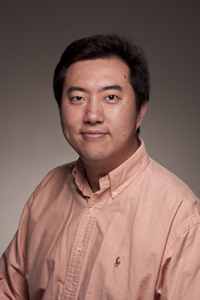Shenyuan Zhang, PhD

Associate Professor
Contact
Medical Physiology
8447 John Sharp Pkwy
2417 Medical Research and Education Building
Bryan,
TX
77807
shenyuan.zhang@tamu.edu
Education and Training
- University of California, Irvine, PhD, Physiology and Biophysics, 2005
- Fudan University, BS, Physiology and Biophysics, 2000
Research Interests
- Ca2+ is a key element in cell signaling mechanism. As an ion, it contributes to the cell membrane potential. As a messenger, it interacts with tens of intracellular effector proteins, including many enzymes, and regulates diversified cellular functions: contraction, secretion, motility, gene expression, proliferation, differentiation and apoptosis.
- Resting intracellular free calcium level ([Ca2+]i) is usually low (100 nM), considered as a "zero/silent state." Upon stimulations, [Ca2+]i can be raised up either by Ca2+ influx across the plasma membrane or by Ca2+ release from intracellular store (the ER and related organelles) through variety of calcium channels. For example, store-operated Ca2+ channels (SOC) exist in numerous cell types, serving as the main source for Ca2+ entry in most non-excitable cells. Regulated activity of SOC channels is essential to the immune response and may play an important role in the cardiovascular system.
- Zhang is interested in the Ca2+ signaling transduction network. Her goal is to discover and understand the missing pieces of this big puzzle, using techniques of molecular biology, biochemistry and genetics. Currently she is focusing on the structures and functions of two newly identified protein components of SOC channels: Stim1 (the ER Ca2+ sensor for SOC activation) and Orai1 (the pore-forming subunit of SOC channels), which are both potential drug targets to treat autoimmune disorders and prevent organ transplant rejection.